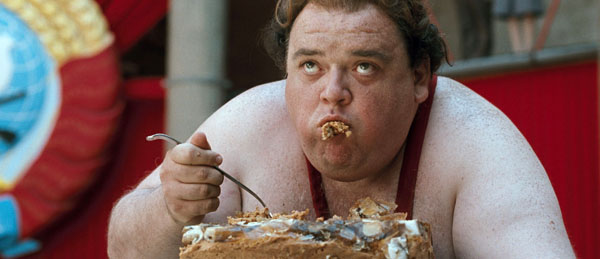|
Reviews of Recent Independent, Foreign, & Documentary Films in Theaters and DVD/Home Video

TAXIDERMIA This one’s a bit of a mind trip, chronicling three generations of the most eccentric paternal line east of the Iron Curtain. Hungarian director Gyorgy Palfi explores the craziness that ensues from three men’s respective obsession—sex, food, and taxidermy. It’s a visceral, grotesque experience, and certainly not for the easily offended. There’s vomit. Copious amounts. There’s also morbidity, nihilism, existentialism, and a man who masturbates so often and so intensely his penis shoots fire. The real MacGuffin of the film is post-war Hungarian history, a roadmap of cultural trends by which most of Mr. Palfi’s surrealist tendencies are understood. The absurdities and paradoxes of life in post-war Eastern Europe seem to make a lot more sense in Taxidermia than they do in the history books. Each of the three vignettes seems to embrace a different kind of surrealistic style. The first takes place at an isolated military outpost, where Morosgovanyi (Csaba Czene), a lowly orderly, lusts after his commanding officer’s enormous wife and peeks through a knot in the wall at the officer’s two beautiful bathing daughters. The setup is farcical, and much of the story seems to be told through metaphor and obvious symbolism. It recalls some of the trippier films of Peter Greenaway, and many of the visceral moments, where particular attention is paid to the various functions of the body, is surprisingly similar in theme to the work of visual artist Matthew Barney. The second tells the story of Morosgovanyi’s now-grown son in the 1960s, a champion competitive eater, and his sweetheart, a woman who actual rivals his own impressive girth. The feel is cartoonish and broad. The two question their career path, lamenting the lack of mobility afforded them by the Soviet presence, between heaping spoonfuls of sloppy beluga roe. Their son, an ironically scrawny runt, eventually grows up to appear in the third segment. He’s a meek
taxidermist, unlucky in love, who takes care of his ailing father, now
grown to elephant size. This final part is creepy and perverse, yet Marc
Bischoff’s strange Lajos (the grandson of Morosgovanyi), a solitary,
blond, beady-eyed waif, demands a high level of sympathy. Overall, it’s
a weird, weird mix. See this film for all its eccentricity, but also for
its cultural sensibility. It’s an odd history lesson, but it’s one all
the same. Just think twice before bringing the kids.
Michael Lee
|

